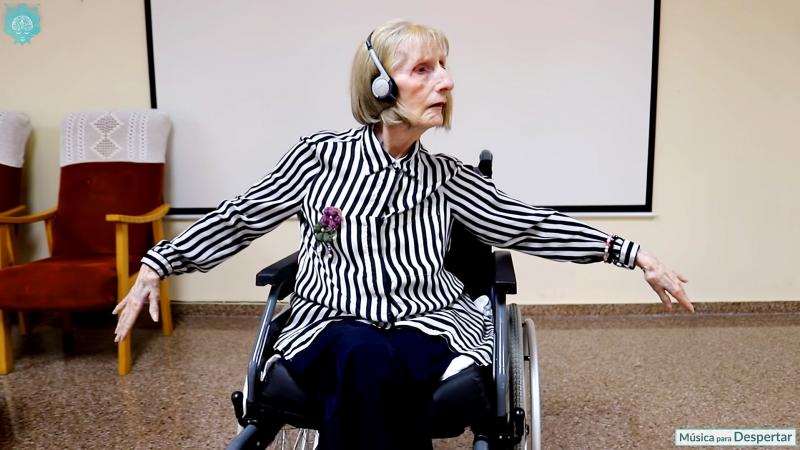We see a frail and elderly woman in a chair, her eyes downcast. She motions for the music to be turned up, a swelling melody from Tchaikovsky’s Swan Lake, and with a little encouragement her hands begin to flutter. Then suddenly her eyes flash and she’s Odette the swan queen at the misty lakeside, arms raised. She leans forward, wrists crossed in classic swan pose; her chin lifts as if she’s commanding the stage once more, her face lost in reverie.
The woman in the film is Marta Cinta Gonzalez Saldana, a former ballet dancer who died last year, the year the video was shot. But the clip has gone viral since being posted recently by Spanish organisation Musica Para Despertar (Music to Awaken), which promotes the value of music for those living with Alzheimer’s.
The particular ability of music to connect with people living with even severe dementia is becoming well known.

Photo courtesy of Musica para Despertar 照片:「喚醒的音樂」提供
Auditory memory may be the last thing to leave us because it’s one of the first things we develop, at around 18 weeks in the womb, says Grace Meadows, program director at Music for Dementia. “They’re some of the deepest neural pathways that get laid down,” she says. Our first language, the babbling and cooing of babies and their carers, is a form of musical exchange. “That’s why it’s so deep and why we’re so responsive to it, because it’s so primal.”
That remains true when people have cognitive impairments, partly because music is processed in so many different parts of the brain. If there’s something blocking its neural pathway, it finds another path. And music from formative stages in our lives tends to have the strongest hold, especially around the teenage years and 20s, the “memory bump” as it is called, when so many intense social bonds and new emotions and experiences take place: first loves, moving to new cities, or perhaps dancing your first leading role on stage.
For Saldana, a strong muscle memory is tied to those musical instincts, but you don’t have to have been a professional dancer for music to spark a physical response.
(The Guardian)
我們看到一位年老體弱的女人坐在椅子上,目光低垂。柴可夫斯基《天鵝湖》的悠揚旋律流瀉出,她示意將音量調高,受到一些鼓勵後,她的手開始顫動。然後她的眼睛忽然閃爍起來,便化身為霧氣迷濛湖畔的天鵝女王奧潔塔,舉起雙臂。她俯身,手腕以經典的天鵝姿勢交叉;她將下巴抬起,彷彿再次縱橫舞台,她的臉龐陷入遐思。
影片中的女人是曾為芭蕾舞者的瑪塔‧辛塔‧貢沙雷斯‧沙爾達尼亞,她已在二○一九年,亦即此影片拍攝的同年去世。但該影片自從最近被西班牙組織「喚醒的音樂」(Musica Para Despertar)發布以來便爆紅。「喚醒的音樂」將音樂的價值推廣給阿茲海默症患者。
音樂具有特殊的能力,可以與人溝通,即便是重度失智的人,這一點已漸為周知。
聽覺記憶可能是最後離開我們的,因為它是最先形成的東西之一,大約在子宮內十八週後發展出來,「給失智者的音樂」計畫總監葛雷絲‧梅多斯說道。「所生成的是一些最深層的神經路徑」,她說。我們的第一語言,即嬰兒的咿呀聲及其照顧者的輕柔低語,是一種音樂交流的形式。「這就是為什麼它如此深刻,也是為什麼我們對它那麼有反應,因為它是如此原始」。
即便有認知障礙,情況仍是如此,部分是由於音樂是在大腦許多不同部位處理的。若其神經路徑受到阻礙,它便找到另一條路徑。我們在成長階段所聽的音樂往往具有最強的影響力,尤其是在大約十幾二十歲時,這就是所謂的「記憶隆起」(memory bump),許多強烈的社交聯繫、新的情感與經驗在那段時期發生:初戀、搬到新城市,或是第一次在舞台上扮演主角。
就沙爾達尼亞而言,她強烈的肌肉記憶(muscle memory)與這些音樂本能是密切連結在一起的,但你不需要是專業的音樂舞蹈家才能讓音樂激發身體反應。
(台北時報林俐凱編譯)

It’s no secret that Japanese people have a deep affection for noodles. Like in the rest of East Asia, noodles are an important staple food, second only to rice. Japanese people have enjoyed noodles for over 1,000 years. The first noodles came from China and were introduced around 800 CE. As time passed, noodles in Japan not only became widespread but also developed some unique Japanese characteristics. The three most popular types of noodles in Japan are ramen, soba, and udon. Ramen, typically made from wheat flour, is usually thin and firm. The dough is kneaded and left to

Rice is an essential ingredient in Taiwanese cuisine. Many foods are made of rice, adding more variety to our cooking, such as rice cake, or “gui.” Wagui is made by steaming rice flour batter in a bowl. The term “gui” refers to a type of food made from rice, while “wa” refers to a bowl. The pronunciation of “gui” in Taiwanese Hokkien is similar to the word for “nobility” in Chinese, so it is common for people to prepare various types of gui, including wagui, as offerings to the gods or ancestors,. 米是台灣重要的主食,用米製成的食品十分多元,豐富我們的飲食,如米做成的「粿」。粿的意思是米做成的糕點,碗粿是將在來米漿倒入碗中蒸熟,因而得名。粿因為音同「貴」,因此碗粿等粿食常用作供品祭拜神明和祖先。 nobility (n.) 高貴,高尚;貴族 offering (n.) 供品 While Taiwan may not be

On Tuesday last week, the flame for this summer’s Paris Olympics was lit at the birthplace of the ancient Olympic Games in southern Greece in a meticulously choreographed ceremony. It will then be carried through Greece for more than 5,000km before being handed over to French organizers at the Athens venue used for the first modern Olympics in 1896. The pageantry at Olympia has been an essential part of every Olympics for nearly 90 years since the Games in Berlin. It’s meant to provide an ineluctable link between the modern event and the ancient Greek original on which it was initially modelled. Once

Continued from yesterday(延續自昨日) https://www.taipeitimes.com/News/lang As with many aspects of Japanese culture, there is etiquette to follow when you enjoy noodles. To fully experience noodles like a local on your next visit to Japan, consider these simple guidelines. First, be careful where you put your chopsticks. Don’t leave them sticking up in the broth or set them at the side of the bowl. When you have finished eating or if you’re taking a break, place them on the chopstick rest next to the bowl. Also, it is impolite to wave chopsticks around or bring them above mouth-level. Second, don’t take too